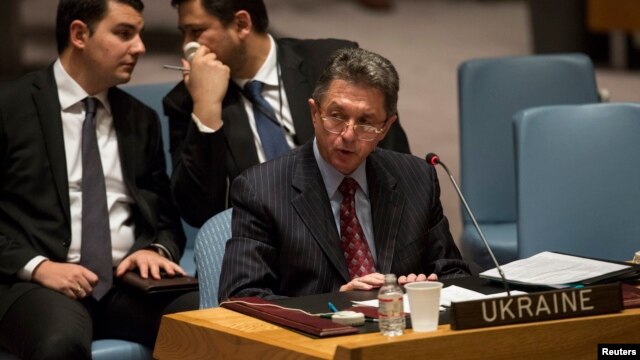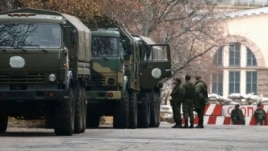Ukraine Says Its 'Restraint' Is Preventing War in East
FILE - Ukraine's ambassador to the United Nations, Yuriy Sergeyev, addresses the U.N. Security Council in New York.
Last updated on: November 12, 2014 6:20 PM
Ukraine’s ambassador to the United Nations, Yuriy Sergeyev, says that it is due to his country’s “restraint” that the conflict in the east between Ukrainian forces and pro-Russia separatists has not yet turned into an all-out war.
"The only reason why... open war in the east of Ukraine hasn’t started yet is because of Ukraine’s restraint,” Sergeyev said.
Sergeyev spoke at an emergency U.N. Security Council meeting called Wednesday after NATO and European monitors reported Russian tanks, troops and weapons crossing the border in the past few days.
The ambassador said Russia is refusing to explain to anyone what it is doing. He also questioned whether the Kremlin was planning an armed invasion.
U.S. Ambassador Samantha Power said Russia and the separatists have not lived up to any of the conditions of the September 5 Minsk cease-fire agreement, including pulling out all foreign fighters from Ukraine.
“Where Russia has made commitments, it has failed to meet them. Russia has negotiated a peace plan, and then systematically undermined it at every step. It talks of peace, but it keeps fueling war,” said Power.
She added that, at the same time, Ukraine has made a genuine effort to stick to the deal, calling on the U.N. to tighten the pressure on Russia.
Deputy Russian Ambassador Alexander Pankin told the council it is Ukraine that is concentrating its forces along the front lines after Kyiv and the separatists agreed to pull them back.
He accused European monitors of failing to take note of this and called reports of a Russian military buildup propaganda.
NATO assessment
NATO on Wednesday said it has observed fresh columns of Russian tanks, artillery and combat troops entering eastern Ukraine in the past few days prompting Ukraine to redeploy government forces in anticipation of a fresh offensive by pro-Russian separatists.
NATO assessment
NATO on Wednesday said it has observed fresh columns of Russian tanks, artillery and combat troops entering eastern Ukraine in the past few days prompting Ukraine to redeploy government forces in anticipation of a fresh offensive by pro-Russian separatists.
Those actions, along with an upsurge in violations of an early September cease-fire between the rebels and Kyiv, have fanned worries that full-scale fighting may resume.
"We have seen columns of Russian equipment – primarily Russian tanks, Russian artillery, Russian air defense systems – and Russian combat troops entering into Ukraine," said NATO’s Supreme Allied Commander Europe, U.S. Air Force General Philip Breedlove.
"There is no question any more about Russia's direct military involvement in Ukraine,'' Breedlove added, speaking during a visit to Bulgaria.
A day earlier, Breedlove said at least 250 to 300 Russian troops remained inside eastern Ukraine helping the separatists. He also said that eight Russian battalions remained on Russia's border with Ukraine, and that Moscow was moving forces capable of using nuclear weapons into Crimea, which it annexed from Ukraine in March.
Russia dismisses charges
Russia immediately denied the allegations.
"We have stopped paying attention to unfounded statements" by NATO's Breedlove "about his 'seeing' Russian military columns," said Igor Konashenkov, a Russian Defense Ministry spokesman, adding that "there were and are no facts'' to support the charges.
Moscow repeatedly has denied any official military involvement in Ukraine, and has described Russian troops fighting alongside rebels as volunteers.
Ukraine’s defense minister, Stepan Poltorak, said Kyiv's forces were being repositioned "to react to unexpected actions of armed groups" in areas outside Kyiv's control. He made his remarks at a government meeting Wednesday, adding that the rebels have received reinforcements.
Ukrainian Prime Minister Arseniy Yatsenyuk called for international engagement to establish peace. He said Ukraine is doing its utmost, but its "powers are limited," especially when facing a nuclear power.
Cease-fire near collapse
The cease-fire agreed to in the Belarusian capital of Minsk on September 5 is now on the verge of complete collapse due to daily fighting and signs of increased troop and hardware movements across Russia's border with Ukraine.
The death toll from the conflict recently passed 4,000, according to United Nations figures.
Echoing Breedlove's assessements, NATO Secretary General Jens Stoltenberg, too, expressed concern about a "significant military build-up."
"This is a severe threat to the cease-fire," he said. "I call on Russia to pull back its forces and equipment from Ukraine, and to fully respect the Minsk agreements."
Russian Foreign Minister Sergei Lavrov told U.S. Secretary of State John Kerry by phone that the cease-fire deal must be upheld, rejecting accusations that Moscow is to blame for its collapse.
Unmarked green soldiers, trucks
Monitors for the Organization for Security and Cooperation in Europe (OSCE) on Tuesday reported seeing a convoy of unmarked green military trucks, with tarpaulin covers, just outside of Donetsk moving toward the city center. The monitors said five of the trucks were each towing 120-millimeter howitzer artillery pieces, while another five were each towing partly concealed multilaunch rocket systems.
Monitors for the Organization for Security and Cooperation in Europe (OSCE) on Tuesday reported seeing a convoy of unmarked green military trucks, with tarpaulin covers, just outside of Donetsk moving toward the city center. The monitors said five of the trucks were each towing 120-millimeter howitzer artillery pieces, while another five were each towing partly concealed multilaunch rocket systems.
A Reuters reporter also recounted seeing "identified military trucks in the center of Donetsk on Wednesday, with soldiers in green uniform without insignia standing nearby. Russian soldiers spotted by local residents have often worn no insignia."
Military personnel and vehicles without markings are reminiscent of activity which preceded Russia's annexation of Ukraine's Crimea in March.
Military personnel and vehicles without markings are reminiscent of activity which preceded Russia's annexation of Ukraine's Crimea in March.
Also Tuesday, Ukrainian military spokesman Andriy Lysenko said "Russian mercenaries" were reinforcing rebel forces near the "line of confrontation."
Economic costs
With the threat of resumed fighting, Ukraine's hryvnia currency has plummeted. It has lost about half its value compared to six months ago
Russia's ruble, too, has fallen by nearly a third this year against the U.S. dollar, driven in part by Western sanctions against Moscow.
Meanwhile, Russian President Vladimir Putin, who blames the West for having inspired a "coup" in Ukraine as part of efforts to weaken Moscow's clout in the region, shows no sign of changing course. Likewise, the EU has given no indications that it will ease sanctions against Russia when it meets to discuss them in Brussels next week.
VOA's Margeret Besheer contributed to this report from New York. Some material came from Reuters.
Meanwhile, Russian President Vladimir Putin, who blames the West for having inspired a "coup" in Ukraine as part of efforts to weaken Moscow's clout in the region, shows no sign of changing course. Likewise, the EU has given no indications that it will ease sanctions against Russia when it meets to discuss them in Brussels next week.
VOA's Margeret Besheer contributed to this report from New York. Some material came from Reuters.




No comments:
Post a Comment